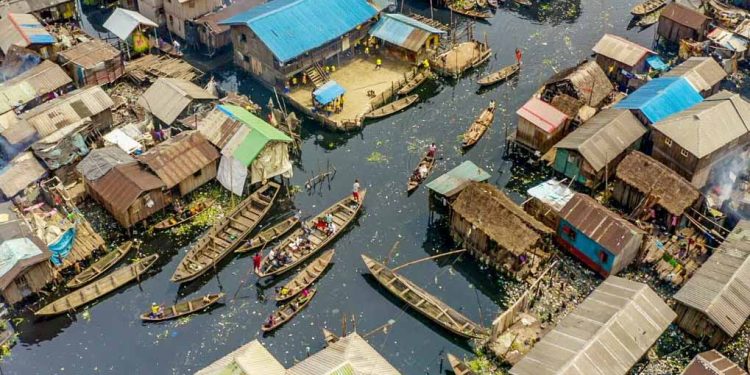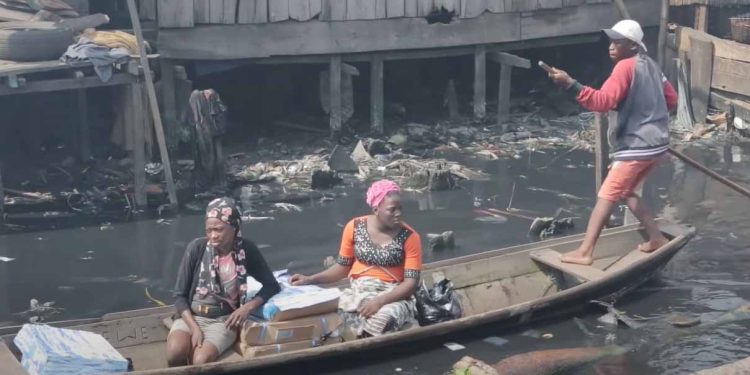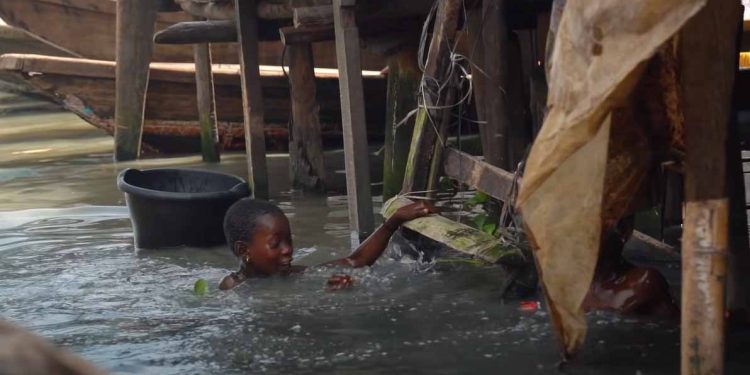Journeymarvel – Africa, a land rich in diversity and natural wealth, also holds stories of harsh realities. One such story is Makoko, a floating village in Lagos, Nigeria, ironically known as the dirtiest floating village in all of Africa.
Makoko, a floating village on the edge of the Lagos lagoon in Nigeria, paints a picture of a unique and challenging life. For centuries, Makoko has been home to thousands of residents living above water in a way vastly different from most places in the world.
 One fascinating aspect of Makoko’s floating village is its unique transportation system. The villagers use wooden boats as their primary means of transportation. Whether for trading, going to school, or simply navigating around, these boats have become an inseparable part of their daily lives. This creates a mesmerizing sight where intricate canal networks connect the floating houses.
One fascinating aspect of Makoko’s floating village is its unique transportation system. The villagers use wooden boats as their primary means of transportation. Whether for trading, going to school, or simply navigating around, these boats have become an inseparable part of their daily lives. This creates a mesmerizing sight where intricate canal networks connect the floating houses.
 The village is known for its stilt houses built mainly from wood. The interconnected structures form a complex and intriguing network. Although seemingly simple, these houses reflect the ingenuity of local architecture and a way of life harmonized with the surrounding environment.
The village is known for its stilt houses built mainly from wood. The interconnected structures form a complex and intriguing network. Although seemingly simple, these houses reflect the ingenuity of local architecture and a way of life harmonized with the surrounding environment.
The residents of Makoko depend heavily on water. Most of them are fishermen whose livelihoods rely on the abundant resources of the lagoon. However, the economic life in Makoko is not solely based on fishing. Handicraft activities like bamboo weaving and woodworking also play crucial roles in supporting their livelihoods. Despite limited resources, the people of Makoko demonstrate resilience and creativity in utilizing their surroundings.
Situated along the Lagos lagoon, Makoko has been home to over 100,000 residents for many years. Behind its extraordinary panorama, Makoko conceals a reality far from beautiful. One of its main challenges is the limited sanitation system. Houses standing above the water make waste management a serious problem. Household waste, industrial waste, and dirty water from daily activities create extremely poor sanitation conditions. The water quality here is very poor, appearing black, with plenty of floating plastic waste.
 Limited sanitation facilities pose a bitter reality for the people of Makoko. Adequate bathroom facilities are almost nonexistent, forcing them to rely on the river as a wastewater disposal site. This situation creates an unhealthy environment that adversely affects public health.
Limited sanitation facilities pose a bitter reality for the people of Makoko. Adequate bathroom facilities are almost nonexistent, forcing them to rely on the river as a wastewater disposal site. This situation creates an unhealthy environment that adversely affects public health.
Water pollution also poses a serious threat in Makoko. Industrial activities around Lagos have contaminated the river water, the primary water source for the village. The polluted water has the potential to negatively impact the health of the residents, especially since it is used for daily needs.
Air pollution is a significant problem due to the densely packed stilt houses and activities such as wood and waste burning, creating a polluted atmosphere. The smoke from these activities, combined with air pollution from the congested water traffic, results in poor air quality. The negative impact can be seen in the high rate of respiratory diseases among the residents, especially children who are more vulnerable.
Makoko, as the dirtiest floating village in Africa, is a real representation of the duality of life. The beauty of its architecture and the uniqueness of its way of life contrast with serious challenges related to sanitation and pollution. Serious attention and greater support are needed to improve the quality of life for Makoko’s residents and safeguard this unique floating village from continuous negative impacts.
Although Makoko faces haunting dirty realities, it remains home to thousands who persevere through life’s challenges. Improvement efforts, while not yet achieving profound changes, reflect a spirit of resilience and a desire to improve difficult conditions.
This floating village, with all its uniqueness, is not just a place to live. For its residents, Makoko is a community interdependent, facing difficulties together and preserving the tradition of living above water. Unity and resilience are the main driving forces for those who, in limited resources, seek ways to endure and continue living.
It is important to acknowledge that the dirty conditions in Makoko are not the residents’ desired choice. Limited access to sanitation facilities and environmental pollution create demanding living conditions. Therefore, understanding and empathy from outsiders are key to paving the way for sustainable improvements.
However, while striving to improve health and sanitation conditions in Makoko, it is also crucial to maintain cultural uniqueness and environmental sustainability. Involving residents in decision-making processes is a vital step toward sustainable improvement. Skills training programs, education, and health awareness can empower the community to take an active role in building a better future.
Collaborative Partnerships:
Collaboration between the government, non-profit organizations, and the private sector is crucial. Building strong partnerships can achieve better efficiency in providing healthcare, sanitation, and other basic infrastructure services. Financial and technical support can also expedite the implementation of needed solutions.
Education and Awareness:
Education is the key to changing the mindset and behavior of the community. Education programs focusing on cleanliness, sanitation, and the importance of environmental conservation can shape a generation more aware of sustainability.
Technological Innovation:
Appropriate technology utilization can help improve the quality of life in Makoko. Solutions such as innovative sanitation systems, eco-friendly technology, and sustainable infrastructure can bring positive change.
Better Health Access:
Providing better healthcare facilities and easy accessibility is a key factor in improving the health conditions of Makoko’s residents. By offering better access, a decrease in disease rates and an improvement in well-being can be expected.
Consideration of Social and Cultural Aspects:
In any proposed changes, it is essential to consider local values and traditions. Aligning solutions with the needs and aspirations of the community is a vital step in creating meaningful change.
The floating village of Makoko has attracted international attention. Many tourists and journalists have visited to witness the unique life in this village. Some projects and initiatives have also been undertaken to assist this community.
As of now, the Makoko floating village still stands, but it lives under the shadow of eviction threats. In recent years, Nigerian authorities have initiated mass demolitions, citing safety and security issues, along with plans to create luxury urban residences near the area. The local government does not officially recognize this settlement. This is because the residents are migrants from other regions. Additionally, the floating village is also notorious for being very dirty and polluted.









































